hankyoreh
Links to other country sites 다른 나라 사이트 링크
Korean American activist fights Asian hate
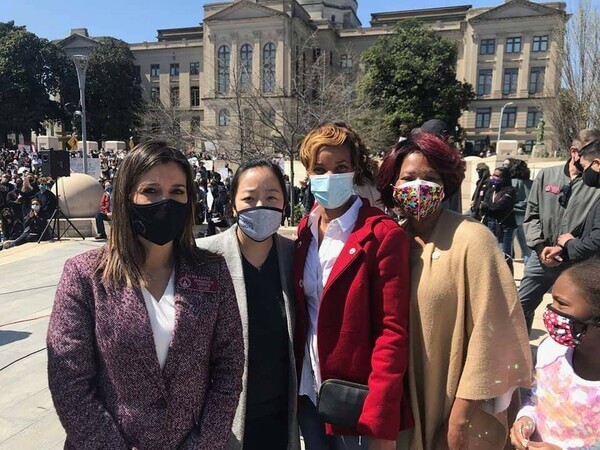
“There were a lot of hate crimes against people of Asian descent even before COVID-19. Since the pandemic started, more of them have been showing up in the statistics. And I think there are actually a lot more hate crimes against Asians than those figures suggest. Crimes against Asians are often categorized as simple burglaries or robberies,” said Sarah Park, president of the Metro Atlanta chapter of the Korean American Coalition, a bipartisan group advocating the political rights of Korean Americans.
Park’s schedule has been full since a shooting spree on March 16 that claimed the lives of eight people. Six of the victims were of Asian descent, and four were Korean Americans.
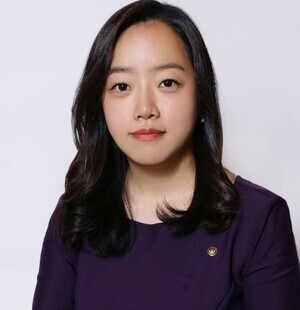
On March 20, Park delivered a speech as a Korean American civil leader at a rally denouncing hate crimes against Asians that brought more than 3,000 people together in front of the Georgia State Capitol. Then on March 26, she personally led an online memorial service at a Korean American center in Atlanta for the shootings victims, with more than 4,000 people viewing the service over the internet.
As the local liaison officer for Gwinnett County in Georgia, which has a population of close to a million people, Park has been focusing on keeping local politicians and bureaucrats up to date on the viewpoint of the Asian American community and on developing county-level countermeasures since the shootings. Park, who was appointed chapter president early this year, immigrated to Atlanta with her family in 1998, at the age of 13. The Hankyoreh spoke with Park over the phone on Monday.
In her speech on March 20, Park noted that “immigrants have faced discrimination and violence since long ago” and emphasized that the solution to this problem is “not confrontation but solidarity.” In the online memorial service, she urged her listeners to acknowledge that hate crimes against people of Asian descent are a problem in American society and to speak out against racial discrimination.
“The history of Asian immigration goes back more than a hundred years, but people of Asian descent still don’t have agency in US society. We get raises at our companies, but few chances to take on major responsibility or leadership roles. The same is true in the fields of arts and culture. We lack the power to make decisions. We suffer systemic discrimination because of our skin color,” Park said.
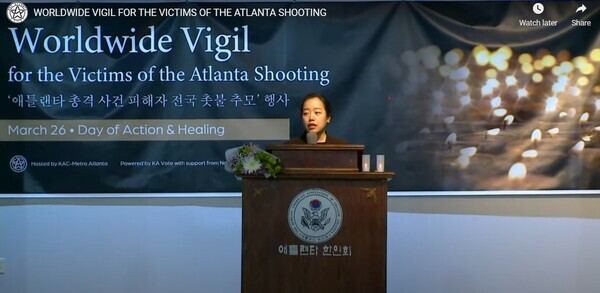
Park offered the following reasons for emphasizing solidarity that transcends race and religion. “Their hatred and violence are based solely on people having a different color of skin. The less they know about people of other races, the more they hate them. It’s important to broaden understanding through solidarity.”
In order to overcome racial discrimination in American society, Park said, there also need to be changes in the Asian American community.
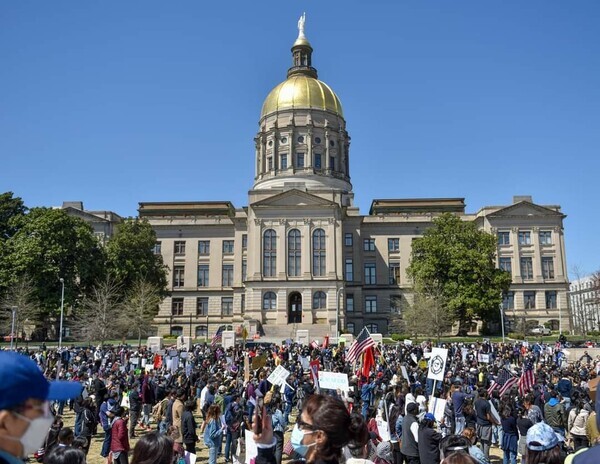
“Asian Americans have been regarded in the US as a ‘model minority,’ people who are dedicated to their work and who don’t speak up about racial discrimination and other social issues. Even when facing discrimination, they’ve kept their heads down, as if nothing were wrong. Meanwhile, those of our neighbors who are information poor or socially vulnerable have been placed in danger. These shootings took place in the heart of the city — if this were Seoul, it would have been Tehran Boulevard in Gangnam. It’s a place where Korean Americans live and work. This gave Korean Americans the impression that this kind of thing could happen to them at any time.”
“Korean American parents used to tell their children to work hard so that they can squeeze through the ‘narrow gate’ in American society. But now, they need to teach their children to speak up when they suffer racial discrimination.”
“By ‘narrow gate,’ I’m talking about discrimination based on skin color. There’s a discriminatory tendency in American society for organizations to think they only have to let in a couple of Asians, no matter how well they do. This idea of squeezing into the narrow gate is similar to how black parents teach their children to keep their voices low and their heads down when a police officer asks them a question.”
I ask Park if she’s concerned that speaking up about discrimination could cause problems. “If you don’t tell people about something, as far as the world is concerned, it never happened. Just as we don’t know what things are like for the black community, the world has no way of knowing what we need. Problems can’t be solved unless you talk about them. The government allocates money to put together data [about discrimination] so as to solve these issues.”
Park seeks accurate statistics about hate crimes and for a federal agency to represent the Asian American communityWhen I mention that there seems to be some debate about whether the shootings were actually hate crimes, Park responds firmly.
“These were clearly hate crimes committed by someone who regards Asian women as sexual objects. The man carried out these shootings at businesses operated and staffed by Asian Americans. His crimes were grounded in hatred and racial discrimination.”
“If investigators conclude that this wasn’t a hate crime, American society will flip out,” Park said, adding that she didn’t think that was a likely outcome.
“Even President Biden and state senators and representatives think it was a hate crime. Biden visited Atlanta three days after the shootings, and Asian American and Pacific Islander members of Congress met personally with the families of the victims. Politicians and federal agencies, including the Department of Homeland Security, are moving quickly without waiting for the results of the investigation. There’s also a debate about systemic solutions.”
Park placed particular emphasis on systemic changes designed to prevent discrimination against people of Asian descent.
“We’re grateful that politicians, the president, and other senior members of the government are taking this incident seriously and are sympathizing with the anger of the Asian American community, but that’s not enough by itself. The important thing is systemic change. First, we need to collect adequate data about hate crimes against people of Asian descent. That data should provide the basis for carrying out thorough training of law enforcement officers. We also need to set up a federal agency that can provide publicly funded services for the Asian American community. That agency should drive systemic change by methodically tackling a number of issues affecting the Asian American community.”
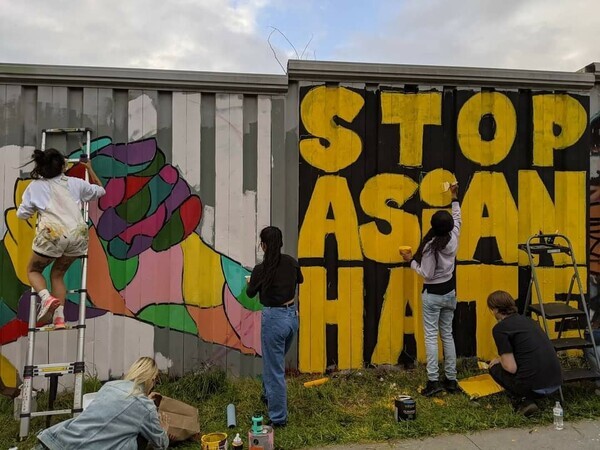
Park has been a member of the Korean American Coalition (KAC) for a decade now. Composed mainly of Korean Americans in the second generation and the “1.5 generation” (referring to those who came to the US as children), the KAC helps Korean Americans exercise their civil rights, including voting, responding to the census and attending public policy hearings. The KAC’s Metro Atlanta chapter has about 400 members.
After studying political science at Georgia State University, Park worked for a while as an interpreter. She then spent five years in the Gwinnett Convention and Visitors Bureau and has been serving the county as a public appointee for the past three years. Since 2013, she has been married to a second-generation Korean American man who’s on the urban planning board for Gwinnett County.
“When I go to church or wherever, I can’t stand seeing people left out. I feel that we all ought to have a good time together. Taking care of the people around me has brought me into a lot of leadership positions at school and church,” said Park, when asked how she’d gotten so actively involved in Korean American civic life.
What about her plans for the future? “I’d like to stay on as a public servant for a long time.”
“We need Korean American politicians, but what’s more important is having high ranking public servants. They’re the ones who decide how our tax dollars are spent; they’re the ones who are responsible for government services.”
By Kang Sung-man, senior staff writer
Please direct comments or questions to [english@hani.co.kr]

Editorial・opinion
![[Editorial] Yoon must halt procurement of SM-3 interceptor missiles [Editorial] Yoon must halt procurement of SM-3 interceptor missiles](https://flexible.img.hani.co.kr/flexible/normal/500/300/imgdb/child/2024/0501/17145495551605_1717145495195344.jpg) [Editorial] Yoon must halt procurement of SM-3 interceptor missiles
[Editorial] Yoon must halt procurement of SM-3 interceptor missiles![[Guest essay] Maybe Korea’s rapid population decline is an opportunity, not a crisis [Guest essay] Maybe Korea’s rapid population decline is an opportunity, not a crisis](https://flexible.img.hani.co.kr/flexible/normal/500/300/imgdb/original/2024/0430/9417144634983596.jpg) [Guest essay] Maybe Korea’s rapid population decline is an opportunity, not a crisis
[Guest essay] Maybe Korea’s rapid population decline is an opportunity, not a crisis- [Column] Can Yoon steer diplomacy with Russia, China back on track?
- [Column] Season 2 of special prosecutor probe may be coming to Korea soon
- [Column] Park Geun-hye déjà vu in Yoon Suk-yeol
- [Editorial] New weight of N. Korea’s nuclear threats makes dialogue all the more urgent
- [Guest essay] The real reason Korea’s new right wants to dub Rhee a founding father
- [Column] ‘Choson’: Is it time we start referring to N. Korea in its own terms?
- [Editorial] Japan’s rewriting of history with Korea has gone too far
- [Column] The president’s questionable capacity for dialogue
Most viewed articles
- 1Months and months of overdue wages are pushing migrant workers in Korea into debt
- 2Trump asks why US would defend Korea, hints at hiking Seoul’s defense cost burden
- 3[Editorial] Yoon must halt procurement of SM-3 interceptor missiles
- 4At heart of West’s handwringing over Chinese ‘overcapacity,’ a battle to lead key future industries
- 5[Guest essay] Maybe Korea’s rapid population decline is an opportunity, not a crisis
- 61 in 3 S. Korean security experts support nuclear armament, CSIS finds
- 7Fruitless Yoon-Lee summit inflames partisan tensions in Korea
- 8First meeting between Yoon, Lee in 2 years ends without compromise or agreement
- 9Under conservative chief, Korea’s TRC brands teenage wartime massacre victims as traitors
- 10[Column] Park Geun-hye déjà vu in Yoon Suk-yeol